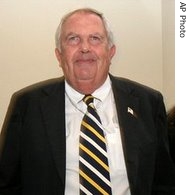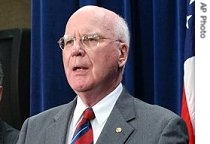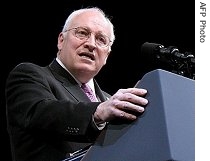-
(单词翻译:双击或拖选)
Capitol Hill
28 June 2007
President Bush and majority Democrats1 in Congress are heading toward a constitutional showdown involving the controversy2 over the firing of federal prosecutors3. VOA's Dan Robinson reports, Democrats accuse the president and vice4 president of being above the law regarding that and other issues.
 |
| Fred Fielding (March 2007 photo) |
Those documents involve former presidential counsel Harriet Miers and former political director Sara Taylor, both of whom were also supposed to appear at public hearings under congressional subpoenas8.
Fielding said the executive privilege claim pertained9 only to documents, but he and other officials made clear the president would also apply it specifically to testimony10 by both former officials.
The White House maintains that its release of 8,500 pages of documents, testimony by Attorney General Alberto Gonzalez at congressional hearings, and an offer to have Miers, Taylor, and Karl Rove, the president's close political adviser11, be interviewed behind closed doors without transcripts12 should be sufficient.
 |
| Sen. Patrick Leahy discusses the Senate Judiciary Committee's issuance of subpoenas for legal basis of domestic surveillance program on Capitol Hill, 27 June 2007 |
Senator Chuck Schumer also addressed the issue.
"The U.S. attorneys investigation14 asks so many questions, so many questions about the rule of law and the truth will come out," he said. "Senator Leahy, I talked to him this morning, and we will pursue whatever it takes to get this information to come out, but it is regrettable that the White House is trying to hide the facts. When an administration is trying to hide the facts, when an administration is unwilling15 to put forward its facts, you wonder what they have to hide."
Democrats also continue to seek documents and testimony on other issues, including the administration's warrantless program of electronic eavesdropping16. The Senate Judiciary Committee issued a subpoena7 to Vice President Dick Cheney's office demanding documents on that matter.
However, the ranking Republican on the committee, Arlen Spector, questioned whether a subpoena to the vice president's office is beyond the scope of the committee's authorization17.
"I think there needs to be a refinement18 of these subpoenas to come within the scope of what has been authorized19 and then to see even within that scope, which is much narrower then the subpoenas issued, to see if we can resolve this matter," he said.
The standoffs over congressional demands, subpoenas, and executive privilege could lead to congressional contempt citations20, and a battle in federal court which might not be resolved for many months, if at all before President Bush leaves office.
Senator Spector suggested that the White House offer for testimony behind closed doors, should be accepted, to move the matter of fired attorneys ahead and lessen21 what he calls "disarray22" in the Department of Justice, even without transcripts.
Democrats and the vice president are also in conflict over another issue, namely his refusal to comply with an existing presidential order regarding the handling of classified documents.
In refusing to allow National Archives information security officials access to his office, the vice president initially23 claimed he is not part of the executive branch of government but the legislative24 branch, citing his role as president of the Senate.
On the floor of the House, Democrats introduced an amendment25 to financial legislation aimed at cutting off government funding for the vice president's office.
 |
| Dick Cheney (file photo) |
Republicans condemned26 the effort, with Congressman Roy Blunt asserting it has political motivations.
"It's not a serious amendment about really de-funding the vice president's office, it is an amendment about something other than that and we know it," he said.
A subsequent statement by the vice president's chief of staff appeared to back away from the original argument.
But that has not quieted complaints by Democrats who point to what they call Mr. Cheney's long history of secretiveness and concealing27 information from congressional investigators28.
 收听单词发音
收听单词发音
1
democrats

|
|
| n.民主主义者,民主人士( democrat的名词复数 ) | |
参考例句: |
|
|
|
2
controversy

|
|
| n.争论,辩论,争吵 | |
参考例句: |
|
|
|
3
prosecutors

|
|
| 检举人( prosecutor的名词复数 ); 告发人; 起诉人; 公诉人 | |
参考例句: |
|
|
|
4
vice

|
|
| n.坏事;恶习;[pl.]台钳,老虎钳;adj.副的 | |
参考例句: |
|
|
|
5
invoking

|
|
| v.援引( invoke的现在分词 );行使(权利等);祈求救助;恳求 | |
参考例句: |
|
|
|
6
improper

|
|
| adj.不适当的,不合适的,不正确的,不合礼仪的 | |
参考例句: |
|
|
|
7
subpoena

|
|
| n.(法律)传票;v.传讯 | |
参考例句: |
|
|
|
8
subpoenas

|
|
| n.(传唤出庭的)传票( subpoena的名词复数 )v.(用传票)传唤(某人)( subpoena的第三人称单数 ) | |
参考例句: |
|
|
|
9
pertained

|
|
| 关于( pertain的过去式和过去分词 ); 有关; 存在; 适用 | |
参考例句: |
|
|
|
10
testimony

|
|
| n.证词;见证,证明 | |
参考例句: |
|
|
|
11
adviser

|
|
| n.劝告者,顾问 | |
参考例句: |
|
|
|
12
transcripts

|
|
| n.抄本( transcript的名词复数 );转写本;文字本;副本 | |
参考例句: |
|
|
|
13
Congressman

|
|
| n.(美)国会议员 | |
参考例句: |
|
|
|
14
investigation

|
|
| n.调查,调查研究 | |
参考例句: |
|
|
|
15
unwilling

|
|
| adj.不情愿的 | |
参考例句: |
|
|
|
16
eavesdropping

|
|
| n. 偷听 | |
参考例句: |
|
|
|
17
authorization

|
|
| n.授权,委任状 | |
参考例句: |
|
|
|
18
refinement

|
|
| n.文雅;高尚;精美;精制;精炼 | |
参考例句: |
|
|
|
19
authorized

|
|
| a.委任的,许可的 | |
参考例句: |
|
|
|
20
citations

|
|
| n.引用( citation的名词复数 );引证;引文;表扬 | |
参考例句: |
|
|
|
21
lessen

|
|
| vt.减少,减轻;缩小 | |
参考例句: |
|
|
|
22
disarray

|
|
| n.混乱,紊乱,凌乱 | |
参考例句: |
|
|
|
23
initially

|
|
| adv.最初,开始 | |
参考例句: |
|
|
|
24
legislative

|
|
| n.立法机构,立法权;adj.立法的,有立法权的 | |
参考例句: |
|
|
|
25
amendment

|
|
| n.改正,修正,改善,修正案 | |
参考例句: |
|
|
|
26
condemned

|
|
| adj. 被责难的, 被宣告有罪的 动词condemn的过去式和过去分词 | |
参考例句: |
|
|
|
27
concealing

|
|
| v.隐藏,隐瞒,遮住( conceal的现在分词 ) | |
参考例句: |
|
|
|
28
investigators

|
|
| n.调查者,审查者( investigator的名词复数 ) | |
参考例句: |
|
|
|















